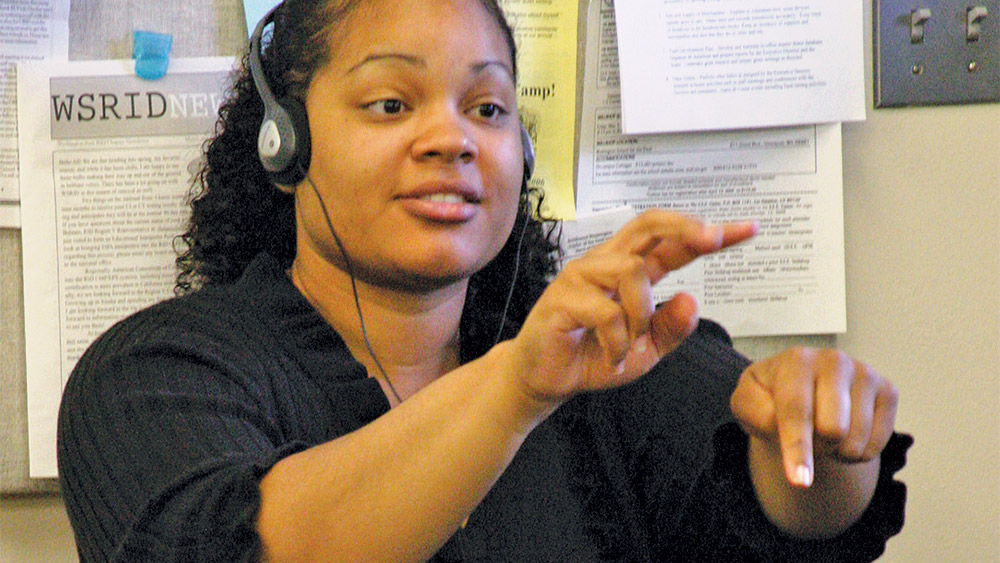Homepage
 A sign language interpreter takes the language of one person and relays it as accurately as possible in another language, working from American Sign Language (ASL) to English or English to ASL. Interpreting the thoughts and feelings of another person involves a complex set of skills. Learning this complex set of skills requires developing multi-cultural knowledge and bilingual skills in both ASL and English. Interpreters also need to understand specialized discourse, nuances of language, and ethical implications of decisions made in the course of interpreting.
A sign language interpreter takes the language of one person and relays it as accurately as possible in another language, working from American Sign Language (ASL) to English or English to ASL. Interpreting the thoughts and feelings of another person involves a complex set of skills. Learning this complex set of skills requires developing multi-cultural knowledge and bilingual skills in both ASL and English. Interpreters also need to understand specialized discourse, nuances of language, and ethical implications of decisions made in the course of interpreting.
Why choose ASL/English Interpretation at PCC?
Salary
The Oregon Employment Division estimates that interpreters in the Portland area earn an average of $30.19 per hour.
In Portland Community College’s ASL/English Interpretation program, you develop the fundamental skills needed to begin working as an interpreter, using the opportunity to practice interpreting skills in class and the field with experienced professionals. Our program offers a wealth of resources, practical experience, and the knowledge needed to succeed.
Another advantage to our program is our large metropolitan area with a significant Deaf community. You will have many options for internships, networking, and socializing within the Deaf and interpreting communities.
For more information, see our frequently asked questions page.
Degrees and certificates
| Award | Length (attending full-time) | Financial aid eligible | Currently accepting students? |
|---|---|---|---|
| Associate Degree: ASL/English Interpreting | 2 years | Limited entry, see how to get into this program | |
| Certificate: Deaf Cultural Studies | 1 year |
Locations
What will you learn?
Class information
PCC’s ASL/English Interpretation program provides a foundation in advanced American Sign Language (ASL), as well as Deaf history and culture, field experience, interpreting theory, and plenty of practice in interpretation in classes and internships. While we offer the same academic approach as other programs do, we emphasize mastery of both the practical skills of interpreting and the academic skills that you need to be employable. Our graduates’ success demonstrates that we prepare interpreters to be true professionals who lead fulfilling careers.
Ours is an intensive full-time six-term program, which admits only 25 students annually. You are required to pass more than one year of prerequisite courses before entering the program, attend practicum courses during enrollment, pass a qualifying exam to qualify for an internship, and work closely with a professional interpreter, among other requirements. All of these factors increase your employment opportunities.
We also offer internships that make a difference. You can receive many of the skills you need working under the supervision of a professional interpreter, which ensures one thing: You learn how to interpret in a real-world scenario. Internships are usually completed in local public schools and community colleges.
What will you do?
Our program will prepare you to work as an entry-level interpreter in settings ranging from K-12 public schools to colleges, businesses, and social services. With additional training and national certification, you may be eligible to work as an interpreter within a specialized field, such as medicine or law. In addition, successful completion of our program prepares you to take the knowledge exam for the National Interpretation Certification (NIC), administered by the Registry of Interpreters for the Deaf (RID).
Some interpreters work as independent contractors. Others are employees. The majority of our graduates are hired to work in educational settings. Currently, the demand for interpreters is high.
Next steps
See how to get into this program.Get started now
Not quite ready to apply?
We can help you get the info you need.
Related programs
PCC offers more than 90 programs.

 Sylvania
Sylvania